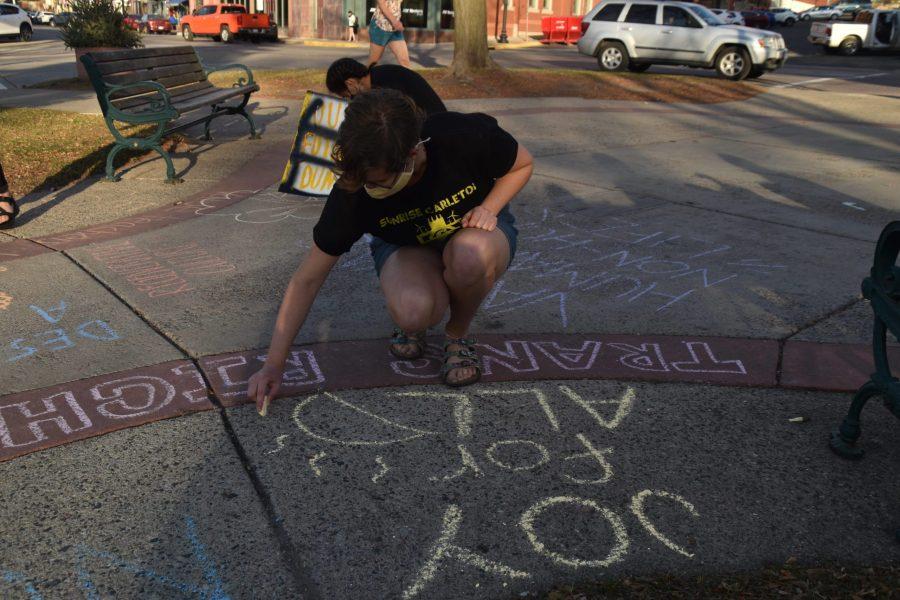On Saturday, November 7, around 80 students marched with Sunrise Carleton through campus and downtown Northfield. Participants were separated into six waves of marches that spanned nearly the entire day, advocating for—among other things—the passage of the Green New Deal.
Sunrise Carleton is a chapter of the national Sunrise movement, which was founded in 2017 to organize youth around climate justice. Specifically, members organize to make climate change a priority across America, create green jobs, combat the political influence of fossil fuel executives and “elect leaders who stand up for the health and wellbeing of all people,” according to the Sunrise website.
“What inspired me to join Sunrise was their intersectional approach to climate justice and willingness to work with other movements to achieve our collective goals,” said Liora Newman ’23. “What inspires me to keep working with Sunrise is that I continually see demonstrations of the collective power of the movement. Sunrise National as a whole is massive—there are hubs all over the country fighting for the same goals.”
Newman, along with Oren Lieber-Kotz ’21, is a lead on the Action Team that organized Saturday’s “March for a Just and Liveable Future.” Sunrise Carleton has two student hub coordinators—Rebecca McCartney ’21 and Maya Stovall ’23—and about 14 leads across various teams, which include Action, Community and Outreach, Communications, and Justice, Equity, and Anti-Oppression. The organization’s impressive leadership capacity was clear on Saturday, as multiple leaders guided each march, providing signs and matching t-shirts to participants. Sunrise Carleton has over 100 members of varying levels of activity.

Each march made several stops to chant, sing, chalk and allow speeches by both organizers and participants alike. Because Biden’s victory was announced on Saturday morning, organizers attuned their messages to what current political changes will mean for the path ahead. “If young people sustain pressure, we can force the Biden administration to begin the decade of the Green New Deal,” said Jeremy Fleishhacker ’23 at the start of one wave of the march.
“Even though voting Joe Biden into office is a great step towards fighting the system that is destroying what we love and the planet we live on, it absolutely by no means is the end goal. He will eventually just become another obstacle to getting what this world needs,” said Adam Kamp ’24, during another speech.
During the march, participants chalked phrases about both what they voted for and what they imagine a just and livable future to look like. Responses included tribal sovereignty, reparations, housing for all, open borders, belief in science, healthcare for all—including mental health care, equality in education with inclusive and diverse curriculums, reproductive rights, intersectional feminism and solutions, representation, LGBTQ rights, celebration of Black queer lives, abolishment of prisons and ICE, labor rights and better wages, democratic norms, a circular economy, carbon-free institutions, renewable energy use and green jobs. In addition, many people wrote that they voted for love, kindness and compassion—and for their lives.
Speeches also stressed the urgency of the need for climate policy and climate justice in the United States. Aashutosha Lele ’23 condemned the failure of people in power to address the “climate justice crisis that we’ve known about since literally the 1980s… which is why now we don’t have the option to say things like incremental change. If they wanted incremental change, they could have started four decades ago, but they didn’t.”
“The time for change is now, it’s not 20 years from now, it’s not 30 years from now, it’s this year, next year, this month, and today,” reiterated Ella Stack ’22. Several people at the march emphasized that the path to climate justice is a long, long road, but reflecting on the day, Newman said, “I think we activated a lot of Carleton students to take action for climate justice. While we were marching in small groups because of COVID, we had so much energy that it didn’t matter.” Sunrise leaders encouraged students to continue to speak up and engage in activism because, as Fleishhacker said, “Electing Biden was a start, but it certainly is not enough.”
Sunrise Carleton has a full hub meeting on November 19 to welcome any new members and discuss post-election strategy.












